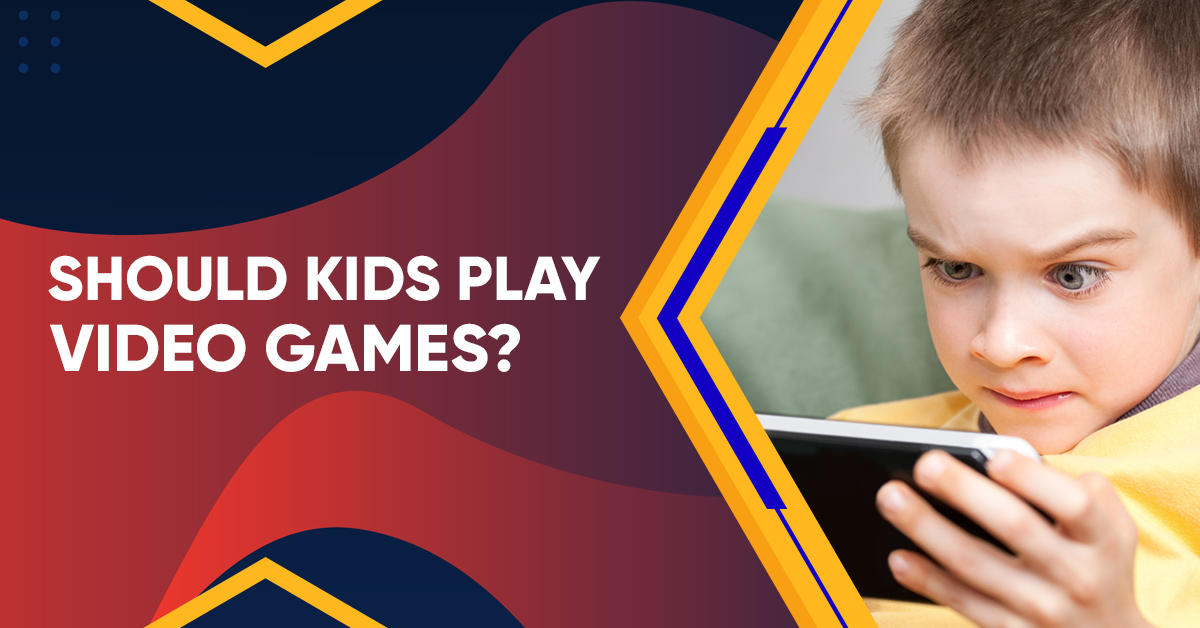Should Kids Play Video Games?
As technology becomes more and more inescapable, parents must make tough decisions regarding their children. Video games are a popular source of entertainment, competition, and storytelling. However, everyone has heard negative tales of young people becoming reclusive to play their favorite games. Although games can be a great way to spend your time, as a parent you have to weigh the pros and cons to determine if your child is ready to start playing video games.
What Counts as a Video Game?
Video games come in all shapes and sizes. From the console in your home to the apps on your phone, video games are more accessible now more than ever. When people hear the phrase ‘video games’ their mind most likely jumps to a few different things. They may think of an arcade from their childhood, pumping quarters into the machine trying to beat the high score. Others may begin to think of violent shooting games that people play on their Xboxes and PlayStation.
The truth is that both things are obviously video games. What may be less obvious are the many other forms of video games that millions of people play daily. The puzzle games on your phone count as video games. Learning games on the web, designed to teach children math, count as video games. Virtual reality counts as a video game. Video games are all around us in a variety of forms and formats. Video games of all sorts allow the player to play, solve problems, and have fun. When considering if your child should or should not play video games, it is important to keep in mind that video games are not just one thing. There are games out there that meet everyone’s needs.
What are the Pros of Playing Video Games?
The majority of people worldwide have played or actively play video games. What are the benefits these people receive from gaming that keep them coming back for more?
They’re Fun!
First and foremost, games are fun. Games offer players an opportunity to play. To be and do things that they would not normally have the chance to do. Video games allow you to be anything you want to be and do anything you want to do.
Studies have shown that kids learn better when they are having fun and playing. If given the right games, a child can learn all new skills through play. Video games provide a unique opportunity to learn new things through play. The serotonin and dopamine released while playing a game can be enough to aid in brain development and cognitive growth.
A Way to Relax
Video games offer a reasonable escape from reality by placing players in fantastical and magical worlds. Many players report that they rely on video games to help reduce stress in their daily lives. Video games offer the chance to sit down in a comfortable setting and play. Playing games is the best way to release all of those wonderful chemicals in your brain that is good for both your mental and physical health. Playing games gives kids the much-needed relaxation time to destress from their day.
Practice Teamwork and Build Relationships
Video games are a great way to bond with your child. If you are looking for an activity that the whole family can participate in, video games are the answer. Depending on the game you can work both collaboratively with your teammates or play competitive games against others. All of these games provide players with opportunities to build communication and teamwork skills by solving problems and dealing with adversity.
Video games also offer kids the opportunity to make new friends. If your child attends school with other students who play games at home, they may start to make new friends based on the shared hobby. Not only would they be able to talk about games at school, but they could play together either in-person or online at home. Many gamers say that the social nature of games is the thing that they love most about video games.
Engaging in Problem Solving
Games give your child the opportunity to solve problems in a low stake environment. Most games require some type of puzzle to be solved or a quest to be completed. All of these objectives require your child to think of the best solution and find the correct answer through trial and error. Video games can teach kids how to build resilience around learning because they are shown that even if you don’t solve the problem on the first try, you can always respawn and try again.
Exposure to Art and Storytelling
For many young people, video games are the only place where they can experience the artwork. Every game, even low-budget titles, is filled with art. Although not traditional, the people who make games are artists and storytellers. Their work is something to behold when it is done well. Playing video games may spark a new interest in your child that will push them to pursue art, writing, or even game development.
What are the Cons of playing Video Games?
Many of video games’ biggest critics present endless lists as to why video games are damaging to young people. However, most of these claims are unwarranted and unsupported. Although video games do offer a lot of positives to young people, there are still some cons to playing video games as a child.
Not Enough Balance
Video games are a great way to spend your time. However, video games make it easy to sit around playing all day. Many games are designed to encourage players to spend more time in front of their screens making it harder for young people to find balance in their lives. Video games are great in moderation, but quickly become problematic when players are deferring their responsibilities in favor of playing games all day long. For school-age children, video games can often be a source of procrastination or distraction. Video games are time-consuming and can often get in the way of completing school work. Setting expectations around time limits and completing responsibilities before playing are great ways that parents can address this issue.
Video games should be one entry into the list of hobbies your child participates in. Be sure to balance video games with physical activity, reading, and other hobbies.
Inappropriate Games and Interactions Online
One of the biggest cons of video games is that it is difficult to only provide age-appropriate content for your child. Video games are rated for content, but not well regulated. Unless you are completely informed about every game, it is difficult to keep track of all of the content that is available to your child. Parental controls offer a toolbox for parents to keep consoles safe and as long as you do your research, you can have peace of mind that everything your child plays will be age-appropriate.
Both console and computer gaming are heavily reliant on playing with others over the internet. In many scenarios, online play can be like the wild west of video games. You never know what the other people in the game may say or do. Most games offer safety measures for online interactions, but nothing is one hundred percent safe. There are plenty of games on the market that do not require online play. Parents should always do their research on the games their children are playing to ensure their safety. Although unregulated, many games with online communication offer a great opportunity to build communication skills and even make friends from around the world.
Should your child be playing video games?
Like most complicated questions in life, the answer is: It depends. Just like everything else, video games are valuable when played in moderation and the proper setting. Video games can offer a fun and engaging opportunity for your child to make new friends, experience unique stories, and build problem-solving skills. If your child is interested in video games, there is no inherent harm in playing them. Many studies show that video games help develop useful cognitive functions like communication and organization. Playing video games can become problematic or even harmful only when they are used as an escape from responsibility and a balanced lifestyle.
As long as you play an active role in your child’s video game hobby, they should be playing video games. Communicate with your child and explain the value of games. Be sure to set clear expectations surrounding the types of games they play and when they are allowed to play. Be sure to ask your child what they are planning to do when they boot up their favorite console. Communication with your child is the key to making sure that their games are appropriate and only a part of their balanced lives. Sit down with your child and ask to play with them. You will quickly see how engaged your child can become when given the opportunity to play with something that interests them.






